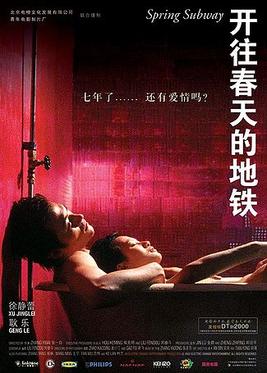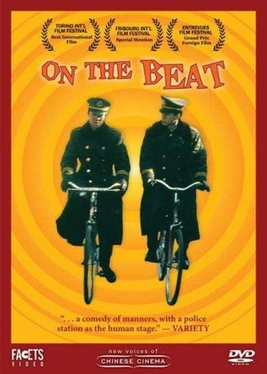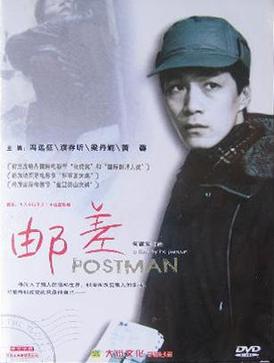Related Research Articles

Jia Zhangke is a Chinese film and television director, screenwriter, producer, actor and writer. He is the founder of Pingyao International Film Festival, dean of the Shanxi Film Academy of Shanxi Media College and the dean of the Shanghai Vancouver Film School at Shanghai University. He graduated from the Literature Department of Beijing Film Academy. He is generally regarded as a leading figure of the "Sixth Generation" movement of Chinese cinema, a group that also includes such figures as Wang Xiaoshuai, Lou Ye, Wang Quan'an and Zhang Yuan.

Tian Zhuangzhuang is a Chinese film director, producer and actor.

Zhang Yuan is a Chinese film director who has been described by film scholars as a pioneering member of China's Sixth Generation of filmmakers. He and his films have won ten awards out of seventeen nominations received at international film festivals.

Wang Xiaoshuai is a Chinese film director, screenwriter, and occasional actor. He is commonly grouped under the loose association of filmmakers known as the "Sixth Generation" of the Cinema of China. Like others in this generation, and in contrast with earlier Chinese filmmakers who produced mostly historical drama, Wang proposed a “new urban Chinese cinema [that] has been mainly concerned with bearing witness of a fast- paced transforming China and producing a localized critique of globalization.”

Keep Cool is a 1997 Chinese black comedy directed by Zhang Yimou and adapted from the novel Evening Papers News by Shu Ping. The film, which is about a bookseller in love in 1990s Beijing, marked a move away from Zhang's earlier period pictures to a more realistic cinéma vérité-like era in his career that also saw him make Happy Times (2000) and Not One Less (1999). Keep Cool also marked only the third time Zhang placed his film in the modern era and the first time Zhang did not work with actress Gong Li.

Wang Quan'an is a Sixth Generation Chinese film director. Wang was born in Yan'an, China. He graduated from the Beijing Film Academy in 1991. He had a ten-year relationship with actress and muse Yu Nan, which ended in 2009.
The BigScreen Festival or BigScreen Italia is a film festival that focuses on Chinese and Italian cinema. It was first held in 2004 in Padua, Italy, but in 2006 moved to Kunming, Yunnan, China.

Shanghai Dreams is a 2005 Chinese film directed by Wang Xiaoshuai and starring Gao Yuanyuan, Li Bin, Tang Yang, Wang Xiaoyang, and Yao Anlian. The film was produced by Stellar Megamedia, Debo Films Ltd. and Kingwood Ltd.

Spring Subway is a 2002 Chinese romance film directed by Zhang Yibai and starring Xu Jinglei and Geng Le. Sixth Generation director Zhang Yang also plays a role. The film represents a relatively new genre in China, the artistic "commercial film" with its international urban sensibilities designed to appeal to young middle-class Chinese. Spring Subway is a stylistic film that plays with chronological conventions and flashbacks, and with characters that often break the fourth wall to directly address the audience.

Yu Nan is a Chinese actress. Born in Dalian, Yu Nan studied at the Beijing Film Academy, where she graduated in 1999.

The Days is filmmaker Wang Xiaoshuai's 1993 directorial debut. Filmed in black-and-white, The Days follows the life of Dong, and Chun, married artists who have recently graduated from the Beijing Art Institute. Living meagerly in the hope of making enough money off their works, it soon becomes obvious to everyone but themselves that the marriage has begun to die.
Weekend Lover is the 1995 directorial debut by Chinese director Lou Ye. The film stars actors Jia Hongsheng and Ma Xiaoqing. Fellow director Wang Xiaoshuai also plays a minor role.

I Love Beijing is a 2001 Chinese film directed by Ning Ying. It constitutes the third film in Ning's "Beijing Trilogy," a loose coterie of films detailing the rapid changes that have befallen Beijing in recent decades. In this final installment, a recently divorced cabdriver, Desi feels disconnected from the modern city of Beijing as he picks up fares around the city, all while engaging in a series of short-term relationships with the various women he meets.

On the Beat is a 1995 Chinese film directed by Ning Ying. It is the second film in Ning Ying's Beijing Trilogy, a collection of three films that follows the massive changes to Beijing in the last decades of the twentieth century. Whereas Ning's previous film, For Fun dealt with the older generation, On the Beat is firmly focused on the story of the middle-aged. I Love Beijing, meanwhile, would follow characters belonging Beijing's younger generations. On the Beat was coproduced by Eurasia Communications, Euskal Media and the state-operated Beijing Film Studio. Some funding was also from the International Film Festival Rotterdam's Hubert Bals Fund.

Mama is a 1990 Chinese film directed by Zhang Yuan. Zhang Yuan's directorial debut, Mama is now considered a seminal film in the history of Chinese independent cinema, and by extension, as a pioneering film of the Sixth Generation of which Zhang is a member. Shot on a very low budget within Zhang Yuan's apartment, Mama follows the story of a mother and her mentally challenged adult son.
He Jianjun is a Chinese film director and screenwriter. A graduate of the Beijing Film Academy, He is considered a leading voice in the so-called "Sixth Generation." He is occasionally credited under the name "He Yi."

Postman is a 1995 Chinese Mandarin drama film directed by He Jianjun and produced by Tian Yan, Shu Kei. It is the story of a shy mailman played by Feng Yuanzheng who steals and reads the letters of people on his route. The film is considered part of China's sixth generation movement.
The 2010 Shanghai International Film Festival is the 13th such festival devoted to international cinema to be held in Shanghai, China. It was held from June 12–20, 2010.

L'Est Films Group Int’l Co (EFG) is an entertainment industry company involved in movie distribution and production.
References
- 1 2 3 4 5 Zhang Zhen (Spring 2004). "Woman with a Movie Camera: Ning Ying's cinematic visions document a rapidly changing China" (PDF). Nieman Reports. Retrieved 2008-03-28.[ dead link ]
- ↑ Kochan, Dror (September 2003). "Wang Xiaoshuai". Senses of Cinema. Archived from the original on 2008-02-09. Retrieved 2008-03-28.
- ↑ "Berlinale: 1997 Juries". berlinale.de. Retrieved 2012-01-07.
- ↑ "From China with Love: The Films of Ning Ying". Harvard Film Archive. Archived from the original on 2011-06-12. Retrieved 2008-03-28.